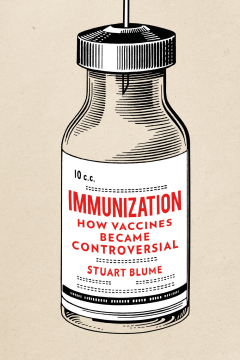
Additional Information
Book Details
Abstract
One of the most important tools in the public health arsenal, vaccines are to thank for the global eradication of smallpox, and for allowing us to defeat the dire threat of infectious disease for more than one hundred years. Vaccine development is where scientists turn when faced with the frightening spread of new diseases like Zika, SARS, and Ebola. So if vaccines have proven to be such an effective tool, why are growing numbers of people questioning the wisdom of vaccinating children? Why have public-sector vaccine producers almost vanished? And can we trust the multinational corporations that increasingly dominate vaccine development and production?
In this highly original and controversial new book, Stuart Blume argues that processes of globalization and unmet healthcare needs are eroding faith in the institutions producing and providing vaccines. He brings together short, readable histories of immunization practices over the past century, from the work of early pioneers such as Louis Pasteur and Robert Koch to the establishment of the World Health Organization and the introduction of genetic engineered vaccines. Focusing on today’s “vaccine hesitancy,” the book exposes the inadequacies of public health persuasion, and discusses what will be needed to restore parents’ confidence. This is a timely history, one that not only sheds new light on the origins of our global vaccine crisis, but also points a way forward.
“This is an important, comprehensive, and pathbreaking book. Eschewing simplistic, unipolar notions of the planning and delivery of international health, it places the history and contemporary provision of immunization on a truly global scale. This is a study that looks at all facets of a complex subject, where the troubled birth and expansion of the use of vaccines is examined thoroughly and fairly. This is scholarship at its richest, which reminds us all about the dangers of technological determinism in all matters of public health. A must read for academic, government, and international health agency audiences, especially those committed to the equitable introduction of vaccines around the world on the basis of careful and transparent consultations with target societies.”
— Sanjoy Bhattacharya, director, Centre for Global Health Histories, University of York and Head, WHO Collaborating Centre for Global Health Histories
“Blume’s Immunization is a clearly written, brilliant, and highly sophisticated look at the roots of the growing phenomenon of ‘vaccine hesitancy.’ He rejects the dominant, and superficial interpretation by public health officials of what is going on, and shows the reader what insights occur when you really stop and listen to what people are saying rather than assuming you already know what motivates them and pigeon-holing their supposed views into various unflattering categories.”
— William Muraskin, Queens College, City University of New York
“Immunization provides great insight into the vaccination issue precisely because it avoids the easy generalizations made by partisans on either side. Blume more usefully points to the complexities and contradictions in the history and social dynamics of vaccination. He presents vaccination as a technology, and as just one of several approaches to promoting health, and thus to be judged in a wider context than a narrow calculation of benefits and risks. Immunization is essential reading for anyone who wants to get beyond the usual polarized positions in the vaccination debate.”
— Brian Martin, University of Wollongong, Australia
“This is a fascinating history of vaccination and its troubles.”
— Times Higher Education
"Blume grapples with the hot-button topic of immunization programs and public resistance to them in this persuasive, challenging chronicle of how vaccines improved human health—and the pharmaceutical industry’s bottom line. . . . Blume’s crucial history illustrates that vaccines have saved countless lives, but they must win the confidence of those who don’t recognize their universal benefit."
— Publishers Weekly, Starred Review
"From vaccine hesitancy to virulent anti-vaccine views, parents are questioning what used to be considered a triumph of public health—vaccines. As so often happens with debates on controversial issues, emotion often trumps information. . . . [Immunization] offer[s] refreshingly fact-based alternatives to the vitriol dominating the current conversation on vaccines. . . . From Cold War politics to neoliberal economics, Blume puts policy and advancement into a broader context in which public health sometimes takes a back seat to other, less noble concerns. His central argument, articulated in the final chapter, is that vaccine hesitancy is rooted in mistrust of the institutions that promote them—especially governments and pharmaceutical companies. . . . Readers who wish to be informed of the current debate and issues surrounding it will appreciate the clear, fact-based approach."
— Library Journal
"While the book provides an interesting social history and an attempt to understand why people resist vaccinations, it also serves as a reminder that it’s a privilege of the developed world to be able to approach a matter of public health and saving lives as a philosophical concern."
— Rachel Dolan, Health Affairs
Stuart Blume is emeritus professor of science and technology studies at the University of Amsterdam.
Table of Contents
| Section Title | Page | Action | Price |
|---|---|---|---|
| Cover | Cover | ||
| Immunization: How Vaccines Became Controversial | 3 | ||
| Imprint Page | 4 | ||
| Contents | 5 | ||
| 1. What Do Vaccines Do? | 7 | ||
| 2. Technologies: The First Vaccines | 36 | ||
| 3. Technologies: Viral Challenges | 64 | ||
| 4. Technologies: The Commodification of Vaccines | 94 | ||
| 5. Policies: Hesitant Beginnings | 125 | ||
| 6. Policies: Vaccination and the Cold War | 154 | ||
| 7. Policies: Vaccination in a Globalizing World | 185 | ||
| 8. The Roots of Doubt | 216 | ||
| References | 245 | ||
| Additional Reading | 252 | ||
| Acknowledgements | 261 | ||
| Index | 263 |
